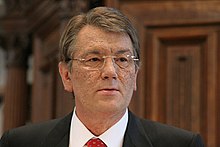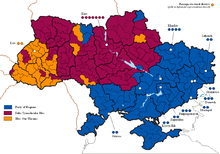Blok Nascha Ukrajina - Narodna samooborona
| Cyrillic ( Ukrainian ) | |
|---|---|
| Блок Наша Україна - Народна самооборона | |
| Transl. : | Blok Naša Ukraïna - Narodna samooborona |
| Transcr. : | Blok Nascha Ukrajina - Narodna samooborona |
Blok Nascha Ukrajina - Narodna samooborona , NU-NS / HУ-НC ( German Block Our Ukraine - National Self-Defense ) was a conservative party alliance in Ukraine from 2002 to 2012 . It supported the former president Viktor Yushchenko . The People's Union of the same name “Our Ukraine” was part of the alliance and continues to exist under this name to this day, but since 2012 without a seat in the Ukrainian Parliament .
Block Our Ukraine
The bloc was founded in the context of the Ukrainian parliamentary elections in 2002 as "Nascha Ukrajina" (or "Viktor-Yushchenko-Bloc Nascha Ukrajina"). 10 moderately nationalist , liberal, and Christian-conservative parties came together to form him. The block Our Ukraine won 23.6% of the vote and 112 of the 450 seats in the Verkhovna Rada, and thus became the strongest force. However, she could not form a majority against the supporters of President Leonid Kuchma and went into the opposition .
In the presidential elections in Ukraine in 2004 was a candidate Yushchenko for the block. He won the first ballot for himself. In the second, manipulated ballot, then Prime Minister Viktor Yanukovych won . This led to massive protests known as the Orange Revolution . The Our Ukraine bloc together with the Julija Tymoshenko bloc (BJuT) were the driving force here. At that time, orange also became the color of the block. When the election was then repeated on December 26th, Yushchenko won. On January 23, 2005, Yushchenko took office. He appointed Yulia Tymoshenko as prime minister of the orange coalition. However, it fell apart and on September 8th he dismissed the government.
The new Prime Minister was Yury Jechanurow of the People's Union Our Ukraine , which has dominated the electoral bloc since it was founded in March. The Popular Front (“Ruch”) , the CDI member Christian Democratic Union and the Congress of Ukrainian Nationalists , which is a member of the AEN , are still part of the bloc . The Party of Industrialists and Entrepreneurs moved from the Alliance “For a United Ukraine” to the Our Ukraine Bloc , and the Ukrainian People's Party “Community” left the Yulia Tymoshenko Bloc to join the NU.
The bloc suffered significant losses in the 2006 parliamentary elections. He only got 14% and 81 seats and thus in third place. After several months of coalition negotiations, Viktor Yanukovych's Party of Regions , the Communists and the Socialist Party of Ukraine formed an “anti-crisis coalition” against the parties of the orange coalition, but with the tolerance of Nascha Ukrajina . Initially, the bloc was involved in the government with the ministerial posts for which the president is responsible, i.e. foreign affairs, defense and justice. Gradually the alliance withdrew into the opposition until it no longer provided a minister.
Our Ukraine - National Self-Defense
In the run-up to the 2007 parliamentary elections , Nascha Ukrajina was renamed “Nascha Ukrajina - Narodna samooborona”. The name change reflected the merger with the political movement National Self-Defense under the leadership of the former Interior Minister Yuriy Lutsenko . In the election, NU-NS was able to roughly hold its result. In contrast to the 2006 elections, however, it became the strongest force almost only in the districts of the Transcarpathian Oblast . In many other regions of western Ukraine it was overtaken by Blok Juliji Tymoshenko. The member parties of the NU-NS had agreed in the run-up to the election to unite to form a political party after the polls. This should be done in spring 2008.
On October 15, 2007, representatives of NU-NS and BJuT signed a coalition agreement. According to this, BJuT should occupy the post of head of government, NU-NS that of parliament president and interior minister. However, it soon became apparent that within the NU-NS there were opponents of an alliance with the Julija Tymoshenko bloc who could prevent the so-called “coalition of democratic forces”. Even after the opening of the newly elected Parliament seven NU-NS MPs (refused Stanislaw Dowhyj , Yuriy Yekhanurov , Ivan Plyushch , Ihor Kril , Vasyl Petjowka , Viktor Topolov and Mykola Onishchuk ) its approval of the coalition agreement.
Instead of the planned unification to form a political party, there was a solid crisis in the spring with signs of dissolution. The split in the government camp into supporters of the president and supporters of the prime minister also affected the electoral alliance. Experts expected the NU-NS to break up in the medium term, with parts of the electoral alliance joining the Yulia Tymoshenko bloc . On the night of September 3, 2008, a narrow majority of the NU-NS parliamentary group members voted to leave the government coalition.
Both the People's Union of Our Ukraine and the People's Movement (Ruch) have observer status in the European People's Party . In the 2010 presidential election , the incumbent and chairman of the Yushchenko bloc ran for re-election, but only received 5.45% of the vote. In the parliamentary elections in 2012, the eponymous member party of the bloc ran again (see below), while other leading figures of the alliance ran as part of the United Center party founded in 2008 .
Member Parties Our Ukraine - National Self-Defense

- People's Union "Our Ukraine" - Narodnyj Soyuz "Nascha Ukrajina"
- National self-defense - Narodna samooborona
- Forward, Ukraine! - Wpered Ukrajino!
- People's Movement of Ukraine - Narodnyj Ruch Ukrajiny
- Ukrainian People's Party - Ukrajinska Narodna Partija
- Ukrainian Republican Party "Assembly" - Ukrajinska Respublikanska Partija "Sobor"
- Christian Democratic Union - Christijansko-Demokratichny Soyuz
- It's time! - Pora!
- Congress of Ukrainian Nationalists - Kongres Ukrajinskych Nazionalistiw
- Party of Defenders of the Fatherland - Partija sachysnykiw Wittschysny
- European Party of Ukraine - Jewropejska Partija Ukrajiny
People's Union "Our Ukraine"
The “Our Ukraine” People's Union ( Narodnyj Soyuz “Nascha Ukrajina” ) must be distinguished from the “Our Ukraine” block . This was one of the bloc's member parties and will continue to exist after 2012. It is practically Yushchenko's “house power” within the multi-party alliance, which is why it was named. The president planned to install this party as a rallying movement for all parties in the bloc. Merger offers were made to several of these parties, but these were rejected. In the parliamentary elections in 2012 , the party won 1.11% of the vote, and entry into the Verkhovna Rada was clearly missed.
Politician
Important representatives of the Bloks Nascha Ukrajina - Narodna samooborona are:
- Viktor Yushchenko, former president
- Yury Lutsenko , party leader of the Narodna samooborona, former interior minister
- Vyacheslav Kyrylenko , chairman of the parliamentary group; Party leader of Nascha Ukrajina
- Arseniy Yatsenjuk , former President of Parliament, former Foreign Minister, with his own party during the 2010 elections
- Roman Bessmertnyj
- Anatoly Hryzenko , former Minister of Defense
- Borys Tarasyuk , former Foreign Minister
- Jurij Jechanurow , former Prime Minister
- Ivan Pljuschtsch , former secretary of the National Security and Defense Council
- Petro Poroshenko , former Secretary of the National Security and Defense Council, former Foreign Minister
Web links
- Official website of the Nascha Ukrajina - Narodna Samooborona block
- Rasom side of the Nascha Ukrajina block - Narodna Samooborona
Individual evidence
- ↑ Archive link ( Memento of the original dated December 10, 2007 in the Internet Archive ) Info: The archive link was inserted automatically and has not yet been checked. Please check the original and archive link according to the instructions and then remove this notice.
- ↑ Archive link ( Memento of the original dated December 2, 2007 in the Internet Archive ) Info: The archive link was inserted automatically and has not yet been checked. Please check the original and archive link according to the instructions and then remove this notice.
- ↑ Archive link ( Memento of the original from June 4, 2008 in the Internet Archive ) Info: The archive link was inserted automatically and has not yet been checked. Please check the original and archive link according to the instructions and then remove this notice.
- ↑ NEWSru.ua: Коалиции больше нет: НУ-НС разрывает союз с БЮТ. Далее - новая коалиция или роспуск ВР ( Memento of the original from September 4, 2008 in the Internet Archive ) Info: The archive link was inserted automatically and has not yet been checked. Please check the original and archive link according to the instructions and then remove this notice.
- ↑ DPA: Elections: Yanukovych's election victory in Ukraine confirmed. In: Focus Online . January 19, 2010, accessed October 14, 2018 .
- ↑ http://ukraine-nachrichten.de/volksunion-unsere-ukraine-will-wachsen_32_Ppolitik_Nachrichten


